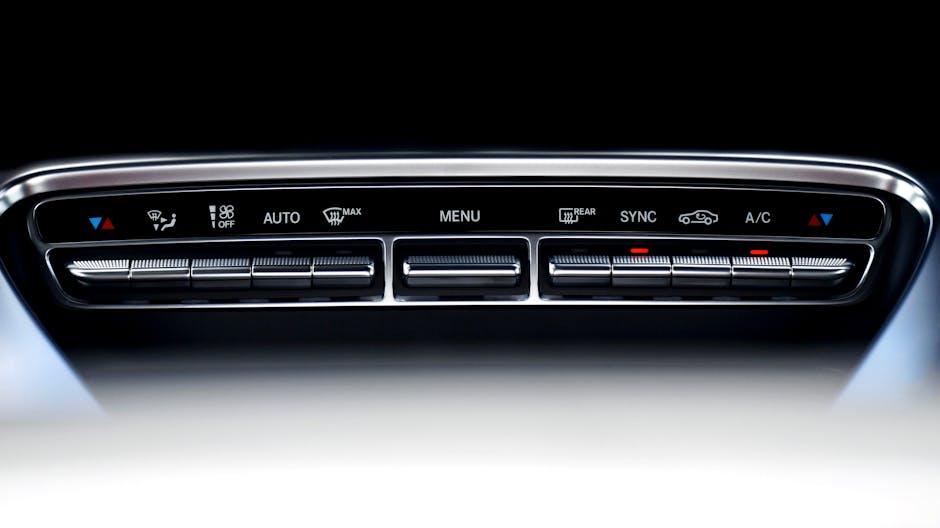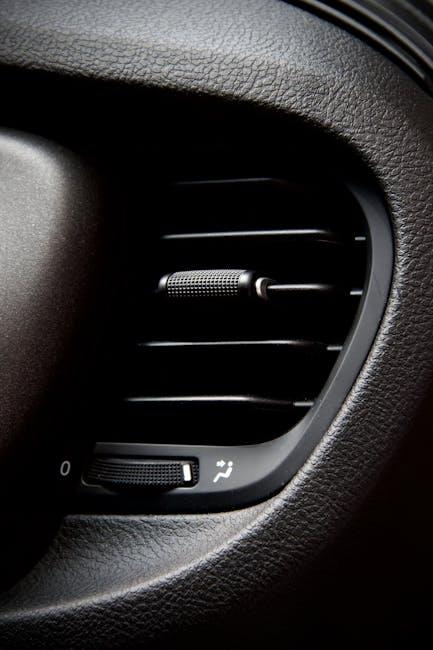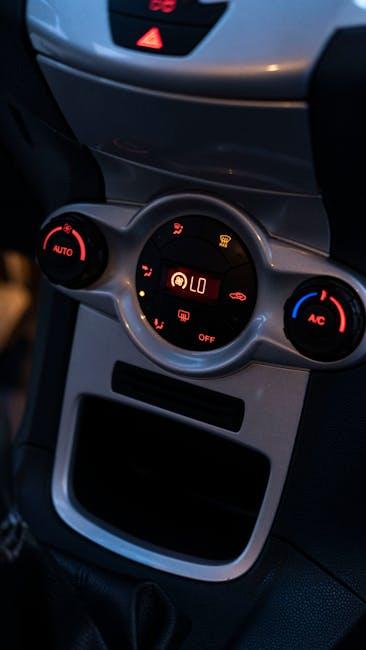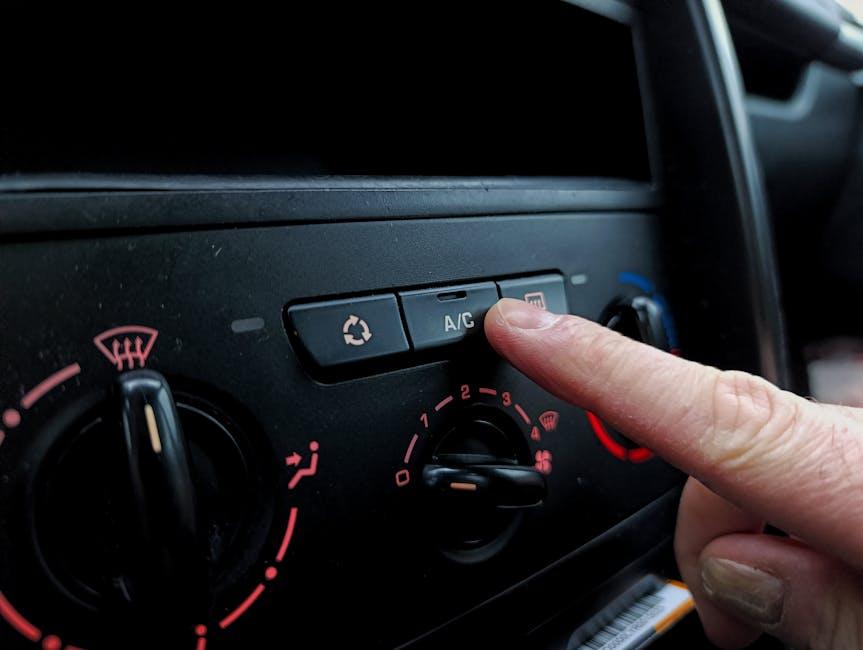Imagine stepping into your car on a sweltering summer day, only to be met with a whisper of warmth instead of the refreshing blast of cool air you expect. Your vehicle’s air conditioning system, a silent hero in the battle against heat, might be sending subtle signals that it’s running low on refrigerant. Recognizing these signs early can save you from uncomfortable drives and costly repairs down the road. In this article, we’ll explore the key indicators that your car’s AC needs recharging, helping you stay cool and confident behind the wheel.
Table of Contents
- Common Warning Signals of Low Refrigerant Levels
- How to Identify a Weak or Ineffective Cooling System
- Understanding the Role of Refrigerant in Your Car’s AC Performance
- Detecting Unusual Noises and Odors Indicating AC Problems
- Expert Tips for Safely Checking and Recharging Your AC System
- When to Seek Professional Help for AC Maintenance and Recharging
- Q&A
- Key Takeaways

Common Warning Signals of Low Refrigerant Levels
When your car’s AC system starts to lose its chill, it’s often because the refrigerant is running low. One of the first signs you might notice is a gradual decline in the coolness of the air coming through the vents, especially on hotter days. You may also experience that frustrating scenario where your AC works fine at first, but as you drive, it seems to weaken and eventually blows warm air. Besides temperature fluctuations, listen for unusual noises—hissing or bubbling sounds can indicate escaping refrigerant, a red flag that your system needs attention.
Keep an eye out for these common signs that signal your car’s AC could be gasping for more refrigerant:
- Slow cooling response: The air doesn’t get cold as quickly as before.
- Ice buildup on AC components: Frost or ice near the evaporator can happen when refrigerant is insufficient.
- Increased humidity inside the car: Low refrigerant means your system struggles to dehumidify the air properly.
- Frequent compressor cycling: The compressor turns on and off more often, indicating stress on the system.
| Warning Signal | What It Means |
|---|---|
| Weak airflow | Possible blockage or refrigerant leak |
| Warm air from vents | Refrigerant level too low to cool effectively |
| AC compressor not engaging | System low on refrigerant; compressor protection active |
| Unusual noises | Potential leak or mechanical issue due to low refrigerant |

How to Identify a Weak or Ineffective Cooling System
When your car’s air conditioning system starts losing its chill, it’s often more than just an annoyance—it can signal underlying issues that demand your attention. One of the telltale signs is inconsistent airflow; you may notice that the cool breeze weakens when driving at low speeds or stalls completely when you switch settings. Additionally, strange noises like hissing or rattling coming from the AC unit often indicate leaks or component wear. Pay special attention to unpleasant odors, which can hint at mold growth or clogged filters reducing system effectiveness.
To help you quickly spot if your cooling system is underperforming, here’s a quick checklist of indicators:
- Warm Air Blowing: Even on the coldest setting, the air isn’t cool.
- Slow Cooling: Takes an unusually long time to reach desired temperature.
- Moisture or Ice Accumulation: Water dripping inside or ice forming on cooling coils.
- Increased Fuel Consumption: AC causing your engine to work harder and consume more gas.
| Symptom | Potential Cause | Immediate Action |
|---|---|---|
| Weak airflow | Clogged filter or refrigerant leak | Inspect filter; check refrigerant levels |
| Unpleasant odor | Mold/mildew growth | Clean vents and replace cabin filter |
| Warm air output | Low refrigerant charge | Recharge AC system |

Understanding the Role of Refrigerant in Your Car’s AC Performance
At the heart of your car’s air conditioning system is the refrigerant, a compound responsible for absorbing heat from the cabin and releasing it outside. This delicate process relies on the refrigerant circulating through the AC system in its precise amount and state. When your vehicle’s refrigerant level drops, either due to leaks or natural depletion, the performance of the AC diminishes significantly. The coolant loses its ability to properly absorb heat, leading to warmer air blowing through the vents and a less comfortable driving experience.
Maintaining the right refrigerant balance is essential, not just for cooling efficiency but also to avoid strain on the compressor and other components. Common signs of a low refrigerant charge include:
- Weak airflow: The breeze feels less forceful despite the fan setting.
- Longer cooling time: The interior takes noticeably longer to reach a cool temperature.
- Hissing noises: Indications of leaks where refrigerant is escaping.
- AC cycles rapidly: System switches on and off frequently, signaling pressure imbalance.
| Refrigerant Levels | Effect on AC |
|---|---|
| Optimal | Strong, consistent cooling |
| Low | Weak airflow and poor cooling |
| Excessive | Compressor damage risk |

Detecting Unusual Noises and Odors Indicating AC Problems
If your car’s air conditioning starts producing sounds that don’t quite belong, such as grinding, hissing, or rattling, it’s a clear indication that something may be off with the system. These noises can stem from issues like low refrigerant levels, worn-out compressor parts, or blocked airflow. For instance, a high-pitched hissing often signals a refrigerant leak, which not only makes your AC less effective but can also harm the environment. On the other hand, rattling might point to a loose belt or debris caught in the blower motor. Paying attention to these audio clues early on can help you avoid costly repairs down the road.
Apart from sounds, unusual odors emanating from your car’s vents are equally telling. A musty or moldy smell often suggests moisture build-up inside the AC evaporator, creating a breeding ground for bacteria and fungi. This not only affects the system’s efficiency but can also be a health concern. Meanwhile, a sharp chemical odor could hint at a refrigerant leak, requiring immediate attention. Here’s a quick guide to common AC odors and their possible causes:
| Odor Type | Likely Cause | Action Needed |
|---|---|---|
| Musty/Moldy | Moisture buildup in evaporator | Clean evaporator, improve drainage |
| Sweet/Flowery | Refrigerant leak | Inspect and recharge refrigerant |
| Burning/Sharp | Electrical issues or overheating | Mechanical inspection |
| Rotten Eggs | Battery or fuel system leak | System diagnostic |

Expert Tips for Safely Checking and Recharging Your AC System
Before diving into recharging your car’s AC system, always start with a thorough inspection. Check for any visible signs of leaks or wear around hoses and connections. Use a leak detector or UV dye to pinpoint escaping refrigerant, which compromises your system’s efficiency. Don’t forget to examine the AC compressor belt for cracks or slackness, as a worn belt can hinder proper cooling. Taking these steps early can prevent costly damage and ensure you’re topping off the refrigerant effectively.
When it’s time to recharge, prioritize safety and accuracy over speed. Use an AC recharge kit with a pressure gauge to monitor the system’s status precisely. Avoid overcharging, as excess refrigerant may cause increased pressure leading to potential damage. Remember to:
- Wear protective eyewear and gloves to guard against refrigerant exposure.
- Park your vehicle on a flat surface with the engine off before connecting the recharge hose.
- Follow the manufacturer’s specified refrigerant type and quantity rigorously.
| Common Mistake | Tip to Avoid |
|---|---|
| Overfilling refrigerant | Use a gauge to monitor pressure closely |
| Ignoring leaks before recharge | Perform a leak test first |
| Using the wrong refrigerant type | Verify vehicle’s refrigerant specification |

When to Seek Professional Help for AC Maintenance and Recharging
When your car’s cooling system starts showing signs beyond a mere drop in temperature, it’s crucial to consult a professional. Persistent weak airflow, unusual noises from the compressor, or a sudden spike in cabin humidity are indicators that the issue might not just be low refrigerant but more complex problems like leaks or component malfunctions. Attempting to recharge the AC without addressing underlying issues could lead to costly repairs down the road. A certified technician will conduct a thorough diagnostic, ensuring your AC operates efficiently and safely.
Furthermore, if you notice the air conditioner blowing warm air even after a recent recharge, or if your system emits a strange odor, it’s time to book a service appointment. These symptoms often signal the need for an in-depth maintenance check or a professional recharge that goes beyond a simple DIY approach. To help you decide when to call in the experts, consider these key signs:
- Irregular cooling performance that fluctuates unexpectedly
- Visible leaks of refrigerant or oily residue near AC components
- Unusual noises such as hissing or grinding from the AC compressor
- Extended running times without achieving desired cooling
| Symptom | Possible Cause | Professional Action |
|---|---|---|
| Warm air from vents | Low refrigerant or compressor failure | Leak detection and recharge or compressor repair |
| Strange noises | Damaged compressor or worn belts | Component inspection and replacement |
| AC cycles on/off frequently | Sensor malfunction or electrical issues | System diagnostics and sensor calibration |
Q&A
Q&A: Signs Your Car’s AC Needs Recharging
Q1: How can I tell if my car’s AC is running low on refrigerant?
A1: One of the first signs is a noticeable drop in cooling performance. If your AC blows warm or lukewarm air instead of refreshing cold air, it likely needs recharging. You might also feel that the air takes longer to cool down or doesn’t get as cold as it used to.
Q2: Are there any unusual sounds that hint at a low AC charge?
A2: Yes, you might hear a hissing or bubbling noise when the AC is on. This sound can indicate a refrigerant leak or other issues tied to low refrigerant levels, signaling the need for inspection and possible recharge.
Q3: Can I smell something odd when my AC needs recharging?
A3: Sometimes, if there’s a refrigerant leak, you might notice a faint chemical or oily scent inside the car. While the AC itself isn’t designed to emit odors, a leak can cause such smells and means the system’s efficiency is compromised.
Q4: How does the airflow feel when the AC refrigerant is low?
A4: The airflow might be weaker or not as forceful as usual. Low refrigerant can cause the compressor to work harder but less effectively, resulting in less powerful air circulation.
Q5: Does the AC’s impact on window fogging indicate a need for recharge?
A5: Definitely. If your AC struggles to defog windows or clear windshield condensation efficiently, it could be a sign that the cooling system isn’t functioning optimally due to low refrigerant.
Q6: Is it normal for the AC compressor clutch to behave differently when refrigerant is low?
A6: If the compressor clutch doesn’t engage properly or cycles on and off quickly, it might be reacting to insufficient refrigerant levels. This is a protective mechanism but also a clear indicator it’s time for a recharge.
Q7: Can poor AC performance affect fuel efficiency?
A7: Yes, a struggling AC system forces your engine to work harder, potentially reducing fuel economy. Addressing low refrigerant by recharging can help the system run efficiently and save fuel.
Q8: How often should I have my car’s AC checked for refrigerant levels?
A8: Generally, it’s recommended to have your AC system inspected annually, especially before hot seasons. If you notice any signs like those mentioned, don’t wait—get it checked to avoid more costly repairs.
Q9: Is recharging the AC something I can do myself?
A9: While DIY recharge kits exist, improper handling of refrigerant can harm the environment and the AC system. It’s best to have a professional technician diagnose and recharge your AC to ensure safety and proper function.
Q10: What happens if I ignore these signs and delay recharging?
A10: Ignoring low refrigerant can lead to compressor damage, system leaks, and ultimately a complete AC failure. Early detection and recharge save money, maintain comfort, and prolong your car’s AC lifespan.
Key Takeaways
Recognizing the subtle—and not-so-subtle—signs that your car’s AC needs recharging can save you from a steamy, uncomfortable drive and unexpected repair costs. Whether it’s dwindling coolness, strange noises, or unpleasant odors, paying attention to these clues helps you stay ahead of the heat. Regular maintenance and timely recharging ensure your car’s air conditioning system keeps you breezy no matter the season. After all, a cool ride isn’t just a luxury—it’s a necessity for your comfort and peace of mind on every journey.

